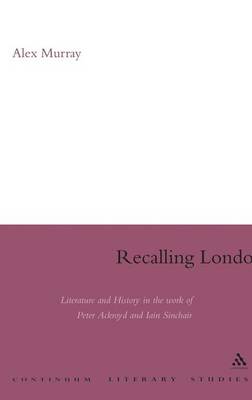Continuum Literary Studies
1 total work
This monograph undertakes the first extensive comparative analysis of the works of Iain Sinclair and Peter Ackroyd, placing the fiction and non-fiction of both writers in relation to the broader cultural, social and political contexts of London from 1979. It begins by tracing the two different Londons of both writers, arguing that their literary and cultural projects are intrinsically linked, yet have remained under explored in academic criticism. Alex Murray argues that while both Sinclair and Ackroyd attempt to utilise radical narrative practices to challenge the dominant historical discourses within contemporary London, those challenges must be placed in relation to broader issues of cultural history, government appropriation of historical narratives and debates about the relationship between literature and the city. This argument is traced from the 'radical' historical fiction of the 1980s which launched the career of both writers, through to their extensive bodies of work on creating a specifically London form of literary history, to their engagements towards the turn of the millennium with larger questions of historiography and material history.
This study then links these issues of narrative and material history, demonstrating the increasingly problematic relationship that both writers have as their fictionally 'radical' recalling of London is transformed into issues of material history, primarily the issues of politics and ethics in historical representation, and the relationship between history and commodification.
This study then links these issues of narrative and material history, demonstrating the increasingly problematic relationship that both writers have as their fictionally 'radical' recalling of London is transformed into issues of material history, primarily the issues of politics and ethics in historical representation, and the relationship between history and commodification.
